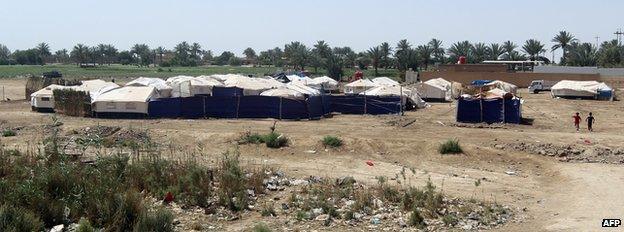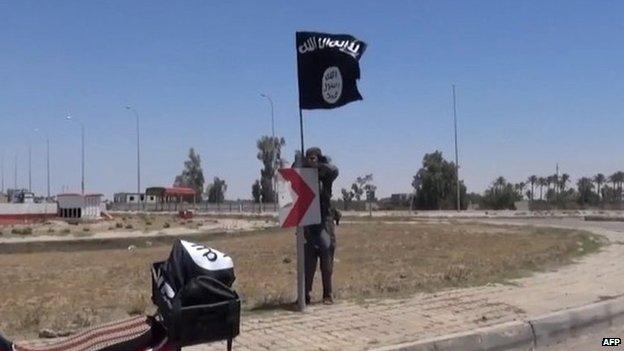Ramadi battle: IS prepares to defend seized Iraqi city
- Published
The BBC had exclusive access to an Iraq coalition mission near Mosul
Islamic State militants are preparing to defend the Iraqi city of Ramadi, witnesses say, as Iranian-backed militiamen gather east of the city.
Residents said IS fighters had set up defensive positions and laid landmines after capturing the city on Sunday.
Militants were also going door-to-door looking for government sympathisers and throwing bodies in the Euphrates river, residents were quoted as saying.
Thousands have fled the city and the UN has warned of a humanitarian crisis.
It says some 25,000 people have left, external the city, only 105km (65 miles) west of Baghdad, in recent days, adding to a flood of people already displaced from the area. Many were sleeping in the open.
The UN says it is trying to meet the needs of those displaced, but funds are low and supplies have almost gone.
The loss of Ramadi, capital of western Anbar province, is a blow for both the Iraqi government and US strategy in the area, says the BBC's Jim Muir in Beirut.
Retaking it is a massive challenge to the Iraqi government, which has had to appeal to the Shia militias despite risks of a sectarian backlash from sending them deep into the Sunni heartland, our correspondent adds.
Police and the military made a chaotic retreat from the city, which has been contested for months, after days of intense fighting. IS said it had captured tanks, armoured personnel carriers and other weapons from government bases.

Dozens of Iraqi soldiers were airlifted to safety after Ramadi fell to Islamic State militants

Relatives of Ramadi residents told the BBC that people were worried and were not leaving their homes. The streets are almost empty but some shops have been forced to open by IS fighters.
Residents say militants have also been trying to restore electricity and water supplies and they are addressing people through loudspeakers in mosques.
Militants were breaking into the homes of policemen and pro-government tribesmen, witnesses told the Associated Press news agency.

Some 25,000 people have fled Ramadi in recent days - joining 130,000 who left the city following IS attacks in April
Footage posted online also appears to show IS releasing inmates from a Ramadi prison.
Some 3,000 Shia militiamen are said to be "on standby" at Habbaniyah military camp, some 20km east of Ramadi, in preparation for an attempt to recapture the city.
On Tuesday, Anbar police chief Kadhim al-Fahdawi told AFP news agency that a large number of well-prepared troops were deployed in Husaybah, which is closer to Ramadi.

He said this area - deep in Iraq's Sunni heartland - would be the "starting point" for operations, but that much planning remained to be done.
Iraq Army Brig Gen Ali al-Majidi told AFP no offensive would be launched until continued attacks by IS east of Ramadi had been contained.
The Pentagon acknowledged on Tuesday that some of the Shia militias were not under direct control of the Iraqi government - something the US has insisted upon.
Spokesman Col Steve Warren also accepted that poor leadership in the Iraqi army was one factor in the loss of Ramadi, along with poor tactics.
The Shia militias, known as the Popular Mobilisation (al-Hashd al-Shaabi), were key to the recapture from IS of another city, Tikrit, north of Baghdad, in April.
But although their presence was welcomed by some Sunni leaders, some Ramadi residents said they feared them as much as Islamic State.

An IS fighter is shown purportedly planting an IS flag in Ramadi on Monday

The US has not given a uniform response to the capture of Ramadi, with the Pentagon suggesting it is not tactically significant, while the state department describes it as a setback.
But the eight sorties flown over Ramadi by US forces in the past day suggest it is a pressing concern, says the BBC's Jon Sopel in Washington.
Anbar province covers a vast stretch of the country west from Baghdad to the Syrian border, and contains key roads that link Iraq to both Syria and Jordan.
IS reportedly controls more than half of Anbar's territory.

Troubled history of Anbar province
Iraq's largest province, which is Sunni-dominated, was occupied by US forces in 2003
Hostile to the US, fighting quickly broke out between US troops and the region's Sunni insurgents
The worst battle came in 2004, when thousands died as US troops and coalition forces struggled to take the town of Falluja
Fighting continued in 2005 and 2006 during which time al-Qaeda in Iraq (AQI) rose to prominence
The US declared victory in 2007 but AQI remained, resuming attacks in 2011 when US troops withdrew
Islamic State and other Sunni insurgents currently control much of the province